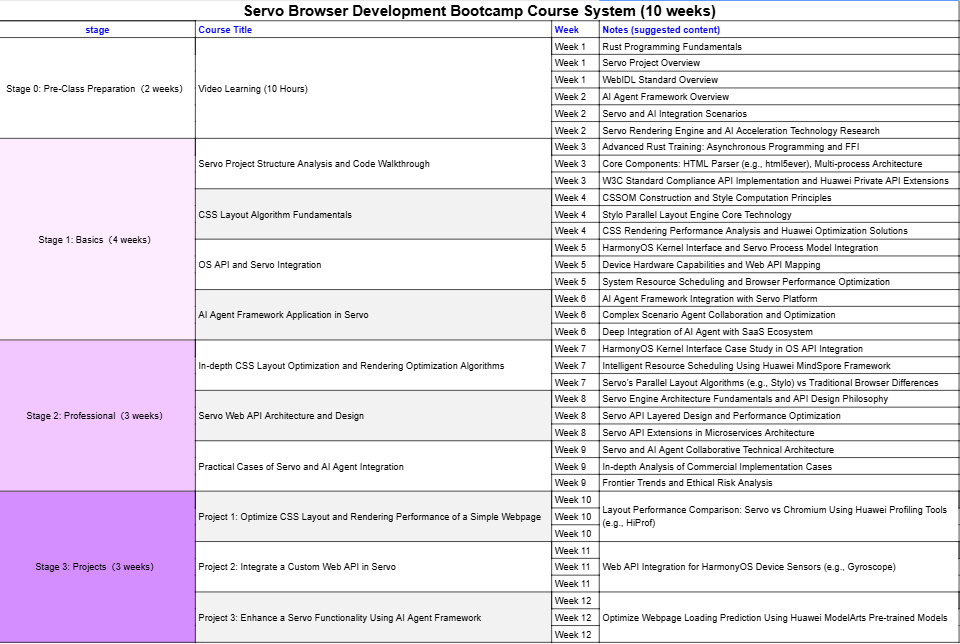Stage 0: Pre-Class Preparation
Requirements for the Pre-Class Preparation of Huawei Servo Development Training Camp
Pass the professional-stage assessment of the following introductory courses:
- Linux - https://opencamp.ai/Linux
- Git - https://opencamp.ai/Git
- Rust - https://opencamp.ai/Rust
Through the study of the above training course system, participants will comprehensively master the basic development skills necessary for the Huawei Servo Development Training Camp, making full preparations for the basic and professional stages of the subsequent Servo Development Training Camp.

Stage 0: Pre-Class Preparation (2 Weeks) Summary and Introduction
Objectives:
- Technical Foundation: Master Rust language essentials, browser architecture principles, and AI Agent fundamentals for Servo development
- Ecosystem Awareness: Establish integrated thinking between Huawei tech stack (HarmonyOS/MindSpore/ModelArts) and Servo engine
- Capability Preparation: Develop code reading proficiency and understand WebIDL standards and multi-threaded architecture design principles
Week 1: Core Technology Establishment
Course 1: Rust Programming Fundamentals
Key Content:
- Memory Safety Mechanisms: Ownership, Lifetimes, Borrowing Rules
- Concurrent Programming:
async/awaitmodel,tokioruntime features - Cross-language Interaction: FFI (Foreign Function Interface) for C/C++ module invocation
- Huawei Ecosystem Integration:
- Rust-HarmonyOS kernel interface interoperability (e.g.,
libhongmengintegration)
Course 2: Servo Project Overview
Key Content:
- Architecture Features: Multi-process model (Browser/Renderer/GPU processes), Stylo parallel layout engine
- Core Components:
- html5ever: High-performance HTML parser
- Necko: Network protocol stack implementation
- WebRender: GPU-accelerated rendering engine
- Huawei Ecosystem Integration:
- Compare Servo's memory management with Huawei Ark Compiler strategies
Course 3: WebIDL Standard Overview
Key Content:
- Interface Definition Syntax: Property/method/event binding rules
- Code Generation: IDL-to-Rust/C++ binding conversion workflow
- Huawei Ecosystem Integration:
- Extend
[HongmengDevice]tags for HarmonyOS device-specific APIs
Week 2: AI-Browser Convergence Concepts
Course 4: AI Agent Framework Overview
Key Content:
- Decision Architecture: Sense-Plan-Act loop
- Core Capabilities: Natural language interaction, dynamic task decomposition, multi-tool collaboration
- Huawei Ecosystem Integration:
- MindSpore Lite deployment optimization for edge inference
Course 5: Servo-AI Integration Scenarios
Key Content:
- Performance Optimization: AI-driven layout hotspot prediction for dynamic Stylo thread allocation
- User Experience: Vision-based adaptive rendering (e.g., foldable screen layout adaptation)
- Huawei Ecosystem Integration:
- ModelArts pre-trained models for resource loading prioritization
Course 6: Servo Rendering Engine and AI Acceleration Pre-research
Key Content:
- Hardware Acceleration: Offload CSS Transform computations to NPUs via HiAI SDK
- Algorithm Optimization: LSTM models for user scroll behavior prediction and pre-rendering
- Huawei Ecosystem Integration:
- HarmonyOS distributed rendering-AI inference co-scheduling mechanisms
Orientation Phase Highlights
- Dual-track Advancement:
- Technical Track: Rust → Servo Architecture → WebIDL → AI Agent
- Ecosystem Track: HarmonyOS interfaces → Ark Compiler → MindSpore → HiAI
- Cognitive Closure:
- Progressive learning path: Language Features (memory safety) → System Architecture (multi-process model) → Industry Standards (WebIDL) → Emerging Tech (AI acceleration)
- Toolchain Preparation:
- Early exposure to Huawei dev tools (HiProf performance analysis, ModelArts model training) for project phase readiness
Upon completing this phase, participants will acquire:
- Ability to navigate Servo source code and identify critical modules
- Foundational skills for cross-language interface development via WebIDL
- Innovative mindset for designing AI-enhanced browser features
